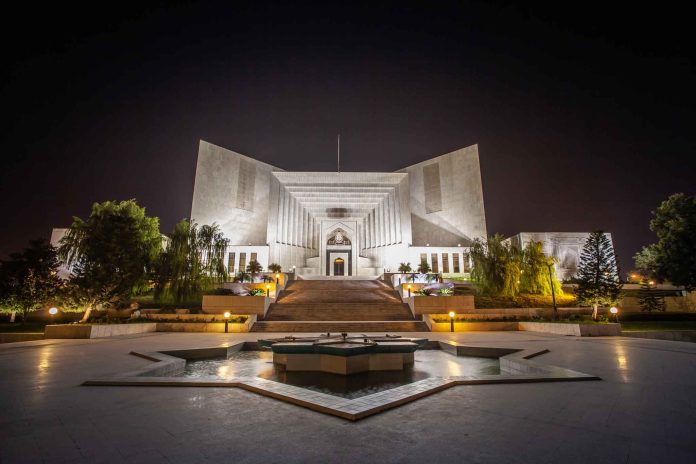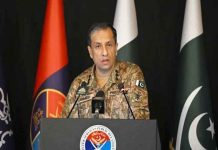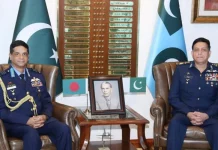——- Justice Bandial makes the remarks as a six-member SC Bench heard pleas challenging the military trial of civilians
——- Justice Mansoor Ali Shah recuses himself from an earlier Bench after govt’s objections
——- Revealing govt’s objection, AGP tells Court one of the petitioners is Justice Shah’s relative, therefore, it may affect his conduct
——- Hearing in the case is scheduled to resume at 09:30AM today
By Anzal Amin
ISLAMABAD: During yet another eventful day of proceedings, Chief Justice of Pakistan (CJP) Umar Ata Bandial said on Monday that he expected that no civilians would be tried in military courts while the matter was being heard in the Supreme Court (SC).
He made the remarks as a six-member SC bench, comprising himself, Justice Ijazul Ahsan, Justice Muneeb Akhtar, Jus-tice Yahya Afridi, Justice Sayyed Mazahar Ali Akbar Naqvi and Justice Ayesha Malik, heard pleas challenging the mili-tary trial of civilians.
“I expect that no military trial [of civilians] will be conducted while proceedings are ongoing,” Justice Bandial said. He also said that all the 102 people currently in the military’s custody should be allowed to meet their families.
A six-member bench was formed earlier in the day after the government had raised objections regarding Justice Man-soor Ali Shah, citing the fact that one of the petitioners, Jawwad S. Khawaja, was related to him.
Justice Shah had subsequently recused himself from hearing the case, although he pointed out that this fact was high-lighted at the very first hearing.
This was the second time the bench stood dissolved. Originally, a nine-bench bench had been formed to hear the case.
However, moments after the first hearing began, Justice Qazi Faez Isa had said he did not consider the SC bench “a proper court”, with Justice Sardar Tariq Masood also endorsing his point of view.
The PTI chief’s lawyer, Hamid Khan, came to the rostrum at the start of the hearing and said that a number hadn’t been assigned to their plea. However, the CJP said the court would come to this issue later, adding that the judges had come back after recovering from a “setback”.
“Instead of arguments, other tactics are being used here,” Justice Bandial said. He noted that the plea filed by the PTI chief raised several requests but Khan told the court that he would only focus on the one against military trials.
Subsequently, lawyer Salman Akram Raja, representing petitioner Junaid Razzak, came to the rostrum. He referred to the British and American constitutions in his argument.
“Has anyone’s trial in [military court’s] begun,” CJP Bandial asked, to which Raja answered in the negative. The top judge then told the lawyer to not talk based on assumptions.
“In this way, the trial of military officers will also be discussed in the future,” Justice Bandial said. He noted that tomor-row was the court’s last working day and told the lawyer to talk about relevant matters.
He also questioned how Article 175(3), which mandates the complete separation of the judiciary from the executive, was applicable in this case.
Raja said that the article was based on the right to fair trial underlined in Article 9 and 10. “No one can be deprived of the right to fair trial,” he said.
However, CJP Bandial asked the lawyer to show the top court a judicial precedent which stated that Article 175 was linked with the Army Act. He also told the lawyer to not make “grand complications”. “Keep your arguments brief and relevant to the case,” he said.
During the hearing, Justice Ayesha asked when Section 2D of the Army Act, which empowers military courts to try civil-ians facing charges of terrorism or abetting terrorist activity, was applicable.
“Can a civilian be tried in military courts or not?” asked Justice Ayesha. She noted that the petitioner was challenging provisions of the Army Act but was not giving reasons for doing so.
“The SC has laid down the principle that judicial affairs can only be run by the judiciary,” Raja said. “No one else can exercise judicial powers under Article 175(3),” Raja said.
Raja further said that there were two kinds of civilians. “One is who renders a service for the armed forces,” the law-yer said, adding that such people were bound by “military discipline”.
He said that the second type were those who had nothing to do with the armed forces. He said that “complete civil-ians” could only be tried by a judge appointed under article 175(3).
“How can we say that military courts are not courts?” Justice Ayesha asked.
“Can the verdicts of military courts not be challenged?” CJP Bandial asked. Raja said that they could be challenged be-fore the army chief or a committee formed by him.
“You can say that the scope of appeal in these courts should be expanded,” the CJP remarked. Here, Justice Naqvi noted, “You are saying that military courts are a parallel system and can’t be called courts.”
Raja replied in the affirmative, highlighting that civilians were not dispensed basic rights during military trials. “Accord-ing to the Army Act, trials are conducted in military court on displinary violations. But the trial of a civilian in military courts is not a matter of disciplinary violations,” he contended.
“This is a good point,” Justice Bandial observed. Meanwhile, Justice Ahsan asked if the petitioner was challenging mili-tary trials to the extent of civilians. “You are not challenging trials of army officials, correct?” the judge asked. The law-yer replied that he was not challenging the trials of army officials.
At one point during the hearing, the CJP asked what the US laws said about civilians who rebelled against the state. “In America, the trials of citizens who indulge in anti-state activities are conducted in civilian courts,” Raja replied.
Separately, Justice Akhtar asked if trials of civilians could be held in military courts if an emergency was imposed in the country and fundamental rights were suspended. Raja replied that the laws in the US were very clear about this.
The CJP noted that such trials were held in civilian courts. Here, Justice Ayesha asked, “Are military trials of civilians held in our region?”
Raja responded that the practice was not followed in India. At one point, Justice Bandial said that the decision under the 21st Constitutional Amendment should be seen. “It mentions the application of Army Act on those who take up weapons against the armed forces.”
The hearing was then adjourned for 45 minutes. When it resumed, the PTI chief’s lawyer Uzair Bhandari came to the rostrum and said that his side supported all the petitioners. “We want an open trial,” he contended, adding that the guilty should be punished.
He also called for forming a judicial commission to probe the events of May 9, when violent protests broke out in the country following the PTI chairman’s arrest.
However, the CJP told the lawyer to not talk about “political gains and aspirations” and to only talk about the law. Dur-ing the hearing, also questioned Attorney General for Pakistan (AGP) Mansoor Usman Awan about the petitioner’s complaints regarding harassment of their families and told him to look into the matter. The hearing was subsequently adjourned for 9:30am today (Tuesday).
Shortly after the hearing first began at 9:30am, Attorney General for Pakistan (AGP) Mansoor Usman Awan came to the rostrum and relayed the government’s objections to Justice Shah’s inclusion in the bench as one of the petition-ers, ex-CJP Khawaja, was related to him.
“One of the petitioners is Justice Shah’s relative. Therefore, it may affect his conduct,” AGP Awan said. However, CJP Bandial interjected and said, “The bench will not be made according to your whims.” Expressing his anger, the CJP said that the government “should not mock the judiciary”.
He asked on what basis the government was objecting to Justice Shah’s presence on the bench. “Are you objecting to the conflict of interest or bias?” he asked. “We have always shown restraint. We didn’t punish those flouting court di-rectives,” Justice Bandial said, adding that implementing the court’s directives was a “moral responsibility”.
He said that ex-CJP Khawaja was not a political person. “You are a lawyer of great character and reputation. There is a whole series of objections regarding the bench being raised repeatedly,” Justice Bandial said.
Talking about the elections suo motu case, the CJP said that there was a discussion about whether the majority or the minority verdict stood. “You are making the bench controversial again,” he told the AGP.
This prompted Awan to state that personally he had no objections to Justice Shah’s presence on the bench. For his part, Justice Shah stated that he had highlighted the fact that one of the petitioners was his relative at the very first hearing and asked those with objections come forward.
At the same time, however, the judge also recused himself from hearing the case. The lawyers present during the hearing urged the judge to reconsider, saying that the case concerned fundamental rights. “Try and understand, this is [a] judge’s own decision. I cannot hear this case,” Justice Shah told them.




